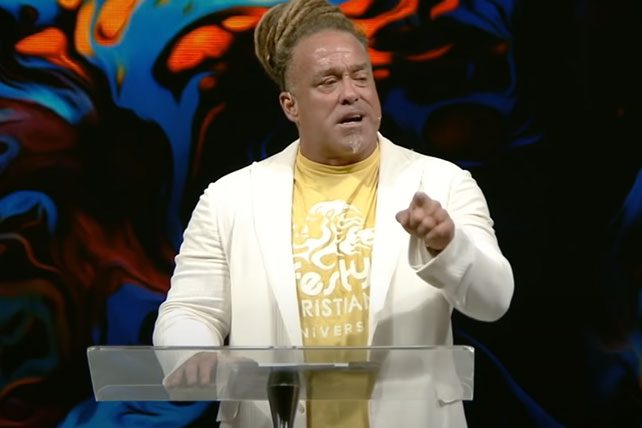I took a deep breath and said a little prayer, “God, Don’t Let This Button Snap Off My Pants.” As much as I hated to admit it, my ice cream making and bread baking habit were causing trouble. Like many of us, eating has been a sense of comfort during the quarantine. Food has been a source of comfort for me many times, and the result hasn’t been a tighter waistline, but lower energy and less productivity. While not everyone who works in ministry has a weight problem, a healthy diet is something we overlook quite a bit.
When we teach our students about taking care of the temple that God has given them, we tell them to avoid pleasures of the flesh, to stay away from drugs and alcohol; however, food is rarely apart of the conversation. Not only do we avoid talking about a healthy diet, but we also encourage poor physical health by offering some of the worst (Even Though It’s Delicious) food options on the planet.
I’m not here to lay guilt, but I believe a healthy ministry contains people who are not only spiritually and emotionally healthy but physically as well. If we’re going to grow healthy disciples, we need to talk about their spiritual, emotional, and physical well being and it starts with:
EMBRACING HEALTHY HABITS IN OUR OWN LIFE
There are natural wear and tear that takes place in youth ministry. When I was in my 20’s, I could keep up for the most part, but today I don’t bounce back quite quickly. While I don’t always need to be the guy throwing a frisbee or playing dodgeball with teens, I do need to make sure my energy levels to do what I do best are protected. That means focusing on these three areas in my physical life:
They are all critical, and they are tied together. When it comes to sleep, exercise, and food, the question you have to ask yourself is, “What Do I Know About Them?” and “Where Do I Get My Information?”
I’m not an expert, and what you do to be physically healthy is going to be unique to you, but to educate yourself, it’s essential to:
Talk to Your Primary Care Physician: Your doctor will either have plans to help you address these issues or at least refer you to an expert.
Go to a Local Gym or Sign Up For a Class: Gym memberships can be pricey, but it’s a great place to meet a trainer who can give you insights into diet and exercises to keep you sharp. Check your insurance because sometimes there are discounts or wellness benefits that can cut the costs.
Connect With Someone Who Has Healthy Habits: If you can’t afford the gym, find someone in your parish who loves fitness and health. Sit with them, pick their brain, and find out what helps them care for their physique.
By learning more about physical health, you are going to be able to set up habits that will keep you healthy and in ministry for a while. You’ll also model for your teens what it looks like to care for your body.
INCORPORATING HEALTHY HABITS INTO MINISTRY
I get it if you put a bowl of kale chips out for your teens to snack on; they’ll think you’ve gone crazy. The way to incorporate healthy habits into your ministry isn’t switching pizza for tilapia. While you do need to look at the food you offer on retreats and at programs, it’s essential to talk about it. We need to make sure we are teaching our teens:
Healthy Self-Image: There are a lot of images and ideas on how they should look and behave, and some of those voices are damaging. We have to remind teens that God created them in His image, and all the FLAWS the world says they should eliminate are a beautiful part of God’s design.
Where to Find Comfort: Porn and drugs aren’t the only ways teens find an escape. Cutting isn’t the only way they inflict self-harm. Food is a source of comfort, and it’s how some of us address our emotions. We have to remind them that real peace comes with putting our faith in the Lord.
Not only do we need to teach our teens about the power of food, but we also have to make sure we set them up for success. That means:
Planning Physical Activities: Whether it’s taking them on a hike or setting up a kickball tournament, a ministry that provides physical fun is one that stresses the importance of physical health.
Offering Alternatives to Pizza: Get rid of the unhealthy stuff, but leave some of the food that isn’t horrible. While teens will still go for the pizza, seeing fruit and granola bars will give them options.
Incorporating Times of Rest and Reflection: Teens need time to rest, and the Church can provide that through silent Adoration, quiet time journaling, and retreats.
Granted, teens don’t think your ministry as the source of their physical wellness, but it can promote healthy habits.
This topic is a difficult area of ministry because it’s something many of us struggle to embrace ourselves. It’s also hard because we live in a world that obsesses over sports, body image, and health, but that doesn’t mean we should ignore it. If anything, a society that sometimes worships fitness and physique needs the Church’s guidance, and if we’re about forming missionary disciples, we should be ready to address it.
Do you agree or disagree that diet, exercise, and physical wellness is a topic youth ministry should address?
This article about healthy habits originally appeared here.










